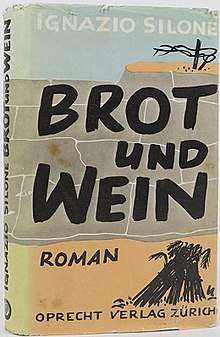Bread and Wine (novel)
Bread and Wine is an anti-fascist and anti-Stalinist novel written by Ignazio Silone. It was finished while the author was in exile from Benito Mussolini's Italy. It was first published in 1936 in a German language edition in Switzerland as Brot und Wein, and in an English translation in London later the same year. An Italian version, Pane e vino, did not appear until 1937.
 First edition | |
| Author | Ignazio Silone |
|---|---|
| Original title | Brot und Wein |
| Country | Switzerland |
| Language | German |
| Published | 1936 |
Published in English | 1936 |
| Media type | |
After the war, Silone completely revised the text, publishing a significantly different version in Italy (in 1955), reversing the title: Vino e pane (‘Wine and Bread’). This updated version is also available in English translation.
Synopsis
Pietro Spina is a young revolutionary who is being sought by authorities. He takes on the disguise of an old priest known as Don Paolo Spada.
Pietro lives in Abruzzo, in village of Pietrasecca (Marsica), and is forced to pretend to be a priest, to avoid arousing suspicion. The fascist police is on his trail, and Pietro has only a few friends to rely on. Meanwhile, the young man is in contact with the sad reality of ignorant peasants of the village of Pietrasecca: he realizes that to make a revolution against fascism is always more difficult, because the problem of the revolution is at its own root. In Abruzzo there are many backward countries as Pietrasecca, where the laws of nature and the peasants are inviolable. Meanwhile, Pietro Spina falls in love with a girl, but can not reveal his true identity...
In music
German communist composer Hanns Eisler used Bread and Wine for seven cantatas,[1] written in 1937, while he was staying with Bertolt Brecht in his Danish exile in Svendborg, despite Silone being excommunicated from the official communist movement, and the Second Moscow Trial just taking place. Eisler did not use Silone's text verbally, but extracted his poetry from Silone's prose. When the scores of these cantatas were published in the 1950s in East Germany, Eisler dated their creation to the year 1935, although the novel had been published only in 1936.
Notes and references
- Hanns Eisler's seven cantatas (suites of two to four songs, for solo voice and instruments): * Die Römische Kantate, opus 60; * Kantate im Exil (Man lebt von einem Tag zu dem andern), opus 62; * Kantate "Nein" (Kantate im Exil No. 2); * Kantate auf den Tod eines Genossen, opus 64; * Kriegskantate, opus 65; * Die den Mund auf hatten; * Die Weißbrotkantate